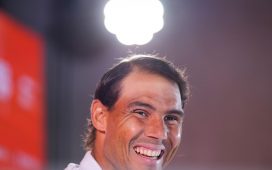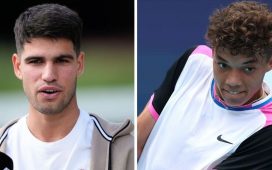In February 2020, as Elena Rybakina’s rise up the rankings became impossible to ignore, she and her coach, Stefano Vukov, made a mischievous bet during the Qatar Open. If she won Wimbledon, he said, he would get a tattoo of her name. She recorded his pledge, but then forgot about it. Covid struck soon after, and instead she spent the next two years trying to recover her form.
Today, Vukov carries Rybakina’s name and the date of this year’s Wimbledon final in indelible ink on his right arm, a permanent reminder of this golden summer. A month ago, Rybakina capped off her startling rise to the big stage in July by winning her first grand slam title at Wimbledon.
“I already forgot [about the bet] – we were laughing around,” Rybakina says. “Before the final, he told me that he would do it. So, he did it. For me, it’s still crazy, I can’t believe it. But it is what it is. We had a bet.”
Rybakina’s run to the Wimbledon title was not at all shocking, but it was still remarkable. She scuppered two grand slam title winners in Bianca Andreescu and Simona Halep, then was ice cold in her first grand slam final as she overpowered Ons Jabeur, the second seed. Her destructive serve, which regularly hits 120mph, was always present in the big moments.
The days that followed were a blur. Rybakina was greeted by masses when arriving home, then received an Order of Friendship medal from the prime minister of Kazakhstan, Alikhan Smailov. She pledged to donate the bonus she received from the Kazakh Federation to dog rescue and junior tennis in the country. For a calm, introverted person, the spotlight was intense.

“It was really nice to see, especially kids, how happy they were to see me. They were hugging, taking pictures. But it was actually very tough for me, just because there were many activities. I didn’t have much rest, to be honest.”
Rybakina’s time at Wimbledon had provided enough outside noise. With the All England Club remaining steadfast on its ban on Russian players because of the invasion of Ukraine, the deeper she went into the tournament the more her identity as a Moscow‑born player who chose to represent Kazakhstan to advance her career was interrogated. In Kazakhstan, Rybakina responded to a question by showing her passport to the audience.
Even beyond her identity, Rybakina’s path is noteworthy. While her peers were preparing for the professional tour as children, she was playing for fun in group sessions after high school. “I was always wanting to go after school because my friends are there, we are having fun on court. I never thought that, in the end, I’m gonna stay professional,” she says.
Rybakina’s trajectory changed after a fruitful junior career yielded offers to play at US colleges. As she stood at that crossroads, she convinced her concerned father to let her try the professional game. After financial problems and a nationality switch, the structure provided by her first private coach, Vukov, in 2018 led to her rise up the rankings.

Watching the pair in practice is always noteworthy. Rybakina is as calm and understated as any athlete, while Vukov is frantic and intense, delivering criticism and feedback constantly. The week before Wimbledon produced a particularly memorable sight on the practice courts at Eastbourne when she became exasperated by his nagging while returning 135mph service bombs of Alexander Bublik. The current world No 47 noticed the tension and closed off the session by suggesting Vukov step up to face the fastballs. There was more than a smirk on Rybakina’s face as the aces flew past her coach.
“I’m a very calm person and he is very active,” Rybakina says. “He has so much energy and I think it works well for us because we are completely different. He’s always pushing me to be better and this works. I’ve had great results with him. We’ll see how long and how many more achievements we can make together.”
Despite fulfilling a lifetime goal, tennis provides no opportunity for rest and introspection. Rybakina returned to competition a few weeks after Wimbledon, losing 6-0 in the third set of her opening‑round match in San Jose against Daria Kasatkina. She fared considerably better at the Western & Southern Open in Cincinnati, reaching the quarter-finals.
As a result of the WTA’s removal of ranking points from Wimbledon in response to the ban on Russian and Belarusian players, Rybakina has fallen two spots to No 25 in the world despite her triumph. She must now consolidate her success while being at risk of drawing top players early at the US Open, which starts on Monday, and beyond.
“It’s never enough, I think. The goal is to win many more grand slams. For this year, my goal was to be top 10,” she says and then laughs. “Still it’s the same goal because I didn’t move in the ranking. It’s just the last grand slam of this year, to try and get as far as I can.”








